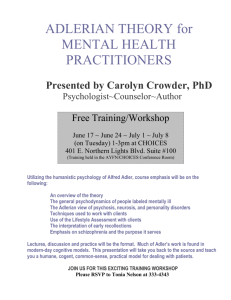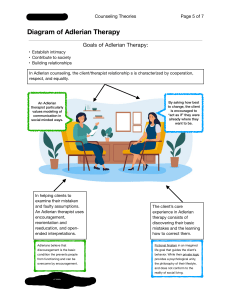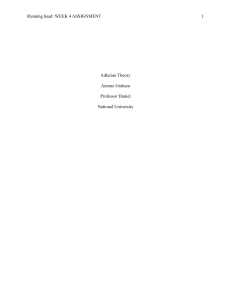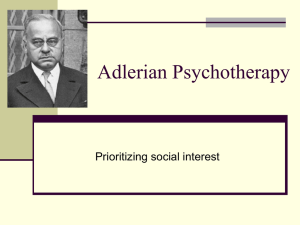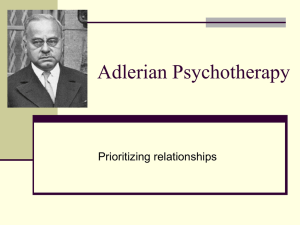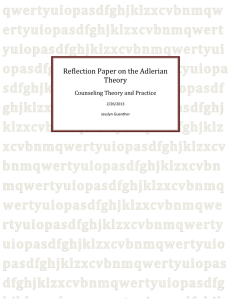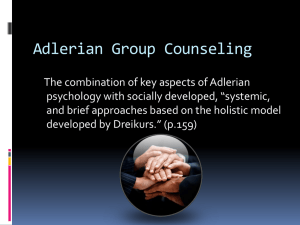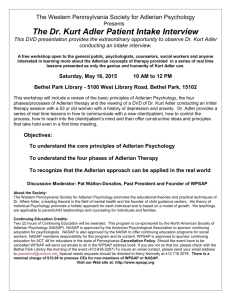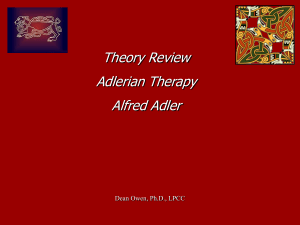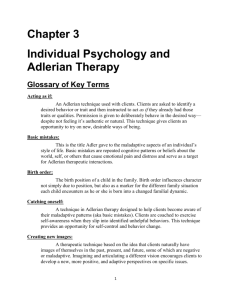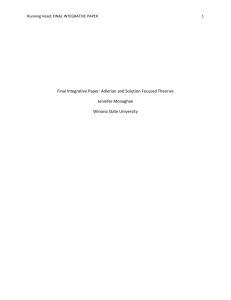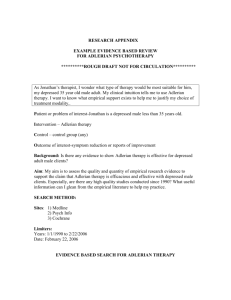Reflection paper: Adlerian therapy Reflection paper: Adlerian
advertisement
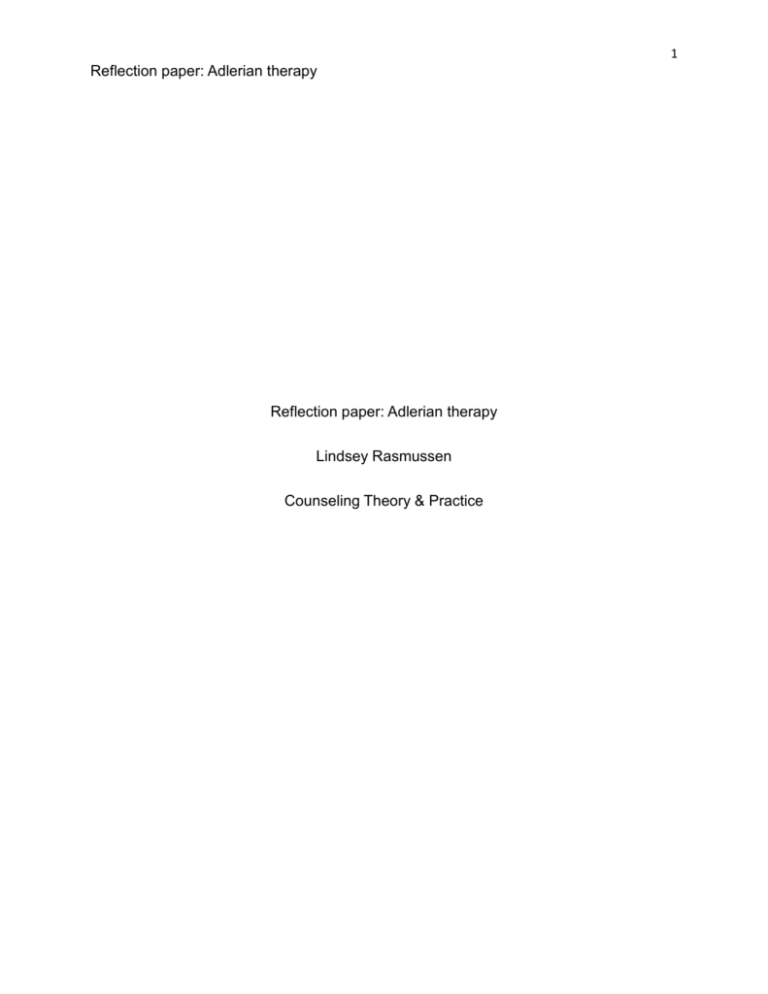
1 Reflection paper: Adlerian therapy Reflection paper: Adlerian therapy Lindsey Rasmussen Counseling Theory & Practice 2 Reflection paper: Adlerian therapy I certainly have an affinity for psychodynamic theory. In particular, I appreciate the emphasis it places on past experiences, the idea that a person’s life is the result of choices they have made at each stage of their development, and the concepts of defense mechanisms and transference. On the other hand, I also understand that psychodynamic theory is not without its problems and, in my opinion, is not a very comprehensive view of human nature. For example, it fails to address the role social and cultural factors play in human development, which I believe have a significant influence. That being said, I have thoroughly enjoyed learning about Adlerian theory because, among other things, it addresses this very point. Furthermore, I agree with many aspects of the Adlerian view of human nature and am excited about its potential, especially as it relates to my developing theoretical orientation and practical applicability. Generally speaking, I agree with a number of Adler’s concepts, including but not limited to the following: (1) people are the creators and creations of their lives; (2) genetics and environment limit a person’s ability to choose and create, but are not as important as what a person chooses to do with their abilities and limitations; (3) what a person perceives and tells themselves about their past experiences shapes the person they are today; and (4) human behavior is socially motivated and goal-driven. On the other hand, there aren’t many aspects of this theory that I do not agree with, except perhaps the view that a person is not “mentally ill” but instead is discouraged. I think it’s important to avoid labeling individuals, but I do not think that every disorder or personal dysfunction is the result of someone’s basic needs not being met…what about the importance of brain chemicals, their balance or imbalance, and what this means in terms of cognitive and emotional functioning? 3 Reflection paper: Adlerian therapy Additionally, I think Adlerian theory is quite relevant to AODA counseling. For example, I think it’s important that a counselor try to identify with or relate to their client, which is something that Adler thought too – he believed a therapist should try to see the world from the client’s perspective. Not only will this help build a healthy therapeutic rapport between a therapist and their client, but it also gives the therapist a chance to understand where a client is coming from and what motivates his/her behavior. Furthermore, the Adlerian emphasis on re-education fits in well with AODA counseling because when it comes down to it, an AODA counselor’s job is to help their clients learn how to live again – without drugs and/or alcohol. Overall, I feel excited and optimistic about Adlerian theory and what it means in terms of real-life application. I think Adlerian therapy has the potential to be quite effective, especially in the AODA field, because of the emphasis it places on the following: (1) personal choice and responsibility; (2) interpretation of past experiences; (3) conscious motivations of behavior; and (4) understanding people within the systems in which they live. In general, Adlerian therapy has the potential to be much more individualized and less like a “one-size-fits-all” kind of treatment. Furthermore, in learning about this theory, I had the opportunity to reflect on some of my past experiences, some of which I haven’t thought about in a very, very long time. For example, in remembering an incident from elementary school I realized just how far back my empathy for others and desire to help goes. And from a professional standpoint, I have found a theoretical orientation I believe in and has the potential to be effective in practice. As a result, I would like to read more about Adlerian theory, especially how it “works” in practice, how effective it can be, and what clientele responds best to this kind of therapy. 4 Reflection paper: Adlerian therapy The objectives of Adlerian therapy are simple and logical, which in my opinion, makes this orientation rather easy to apply in practice. The four objectives are as follows: (1) establish a therapeutic relationship; (2) explore the client’s internal dynamics; (3) encourage the client’s development of self-understanding; and (4) help the client make new choices. However, it is the first goal that is of utmost importance – without a therapeutic relationship there will be very little progress in other areas – no matter what the counselor’s theoretical orientation is. That being said, I would like to focus on this particular objective utilizing the Adlerian perspective. This means I need to work on the following skills: (1) focusing on the client rather than “the problem”; (2) paying attention to the client’s subjective experiences rather than on using techniques; and (3) providing a perspective that will help the client see his/her world differently. The only question I have is this: what, if anything, do I need to do differently with regards to establishing a therapeutic relationship with clients who have alcohol and/or drug issues? As I’ve stated before, I am excited about Adlerian theory and the possibilities that accompany its application in practice with clients who have AODA issues. I want to learn more about the intricacies of Adlerian therapy and talk with professionals with this theoretical background. I would also love the opportunity to experience this kind of therapy firsthand, to see how it feels from a client’s perspective. Furthermore, I want to remain as open-minded as possible as I learn about other theoretical orientations because I know there will be aspects of others I feel equally excited and optimistic about. Overall, I want to utilize what I have learned about Adlerian theory and therapy in my other courses, such as Introduction to Substance Abuse Counseling, and continue to add to my growing knowledge base of counseling theories and therapies.
